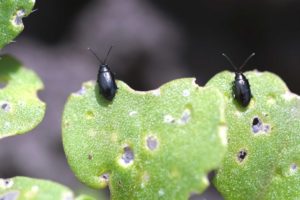 Neonics
Neonics
Neonics are neonicotinoids, a class of insecticides used by farmers to protect fruit, vegetables and crops from various insect pests such as aphids, wireworms, flea beetles and types of chewing and sucking insects.
What are “neonics”?
Neonics are neonicotinoids, a class of insecticides used by farmers to protect fruit, vegetables and crops from various insect pests such as aphids, wireworms, flea beetles and types of chewing and sucking insects.
Neonics can be sprayed on crops. They are often also applied as a seed treatment, which protects planted seeds and crops in the early stages of growth from various insects. Only small quantities of the insecticide are needed to coat the seed, which is then planted in the ground, reducing human and environmental exposure as well as exposure to non-target insects such as bees.
In addition, neonicotinoids are used for killing insects in homes, controlling fleas on pets, and protecting trees from invasive insects such as the Emerald Ash Borer.
See Our PDF to Learn More: DownloadPrint
Journey 2050 Lesson: 2
This resource is a great addition to Lesson 2 – Plant Health
SnapAg:
What are GMOs and are they okay to eat? What does organic farming look like? How are animals like chickens or cattle raised?
snapAG is a series of resources that invite students to explore the hot topics affecting the agriculture industry today. Topics range from organics, biotechnology, GMOs, livestock, and more.
Explore what’s trending in agriculture in Canada by browsing the topics here.
Sources available at: https://aitc-canada.ca/en-ca/learn-about-agriculture
snapAg is brought to you by Agriculture in the Classroom Canada and partners.



